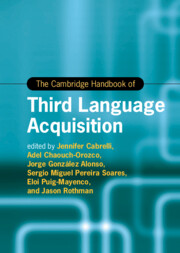Book contents
- The Cambridge Handbook of Third Language Acquisition
- Cambridge Handbooks in Language and Linguistics
- The Cambridge Handbook of Third Language Acquisition
- Copyright page
- Contents
- Figures
- Tables
- Contributors
- Introduction Multilingualism
- Part I Theoretical Approaches to L3/Ln
- Part II L3/Ln across Linguistic Domains
- Part III Becoming and Staying Multilingual at Different Ages
- Part IV L3/Ln in Action
- Part V L3/Ln and Cognition
- 20 Multilingualism and Cognitive Control in the Brain
- 21 Multilingualism and Cognitive Reserve
- 22 The Effects of Multilingualism on Brain Structure, Language Control and Language Processing
- 23 Mechanisms of Cognitive Aging in Multilingualism
- 24 Multilingualism and Language Impairment
- Part VI Research Methods in L3/Ln
- Index
- References
23 - Mechanisms of Cognitive Aging in Multilingualism
from Part V - L3/Ln and Cognition
Published online by Cambridge University Press: 13 July 2023
- The Cambridge Handbook of Third Language Acquisition
- Cambridge Handbooks in Language and Linguistics
- The Cambridge Handbook of Third Language Acquisition
- Copyright page
- Contents
- Figures
- Tables
- Contributors
- Introduction Multilingualism
- Part I Theoretical Approaches to L3/Ln
- Part II L3/Ln across Linguistic Domains
- Part III Becoming and Staying Multilingual at Different Ages
- Part IV L3/Ln in Action
- Part V L3/Ln and Cognition
- 20 Multilingualism and Cognitive Control in the Brain
- 21 Multilingualism and Cognitive Reserve
- 22 The Effects of Multilingualism on Brain Structure, Language Control and Language Processing
- 23 Mechanisms of Cognitive Aging in Multilingualism
- 24 Multilingualism and Language Impairment
- Part VI Research Methods in L3/Ln
- Index
- References
Summary
Aging is a multidimensional process that introduces biological, social, and cognitive changes. The cognitive changes individuals experience during healthy aging are impacted by one’s lifestyle and patterns of behavior. In this chapter, we explore how multilingual language use uniquely contributes to cognitive aging and may stave off cognitive and neurological declines that commonly occur as we age. To this end, we first examine the range of executive functions that are impacted by multilingualism across the lifespan. Next, we explore the neurological implications of cognitive aging by outlining three neurocognitive mechanisms involved in aging, namely cognitive reserve, maintenance, and compensation. Integrating research from the available literature on healthy and pathological aging, we consider whether multilingualism strengthens and alters the neural bases of cognitive aging. As research on multilingual aging is nascent, our chapter ends with an agenda for future research that considers factors unique to multilingualism.
- Type
- Chapter
- Information
- The Cambridge Handbook of Third Language Acquisition , pp. 606 - 632Publisher: Cambridge University PressPrint publication year: 2023

